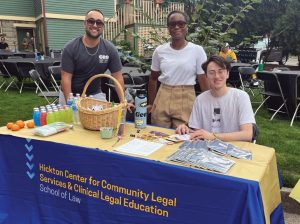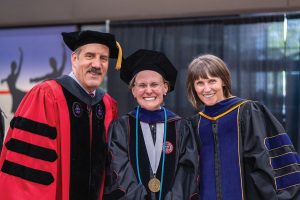From clinics and competitions to IRS advocacy, students are applying tax law to serve clients, shape policy and launch careers.
Tax law isn’t just about codes and calculations — it’s a key to unlocking opportunity across legal practice.
From corporate deals to estate planning, real estate to nonprofits, tax law touches nearly every corner of the profession. Students who pursue this path gain specialized knowledge that opens doors to complex, high-impact work.
Precision, problem-solving and a deep understanding of financial systems are essential. For those who enjoy detail and strategy, tax law offers both intellectual challenge and career flexibility.
The following law schools earned a place on our Tax Law Honor Roll, recognized for the strength of their programs. Following the list, you’ll find the latest developments and news from tax law programs at these various law schools.
Top law schools for tax law
University of Pittsburgh School of Law expanded the reach of its Low Income Taxpayer Clinic (LITC) through advocacy, outreach and policy engagement in 2025. Students partnered with the Pennsylvania Department of Revenue to assist with the Property Tax/Rent Rebate Program and took part in Tax Court Pro Bono Day at the Federal Building.

The clinic also competed in the National Tax Moot Court Competition at Stetson University College of Law and submitted three formal comment letters to the IRS on proposed regulations, covering information collection, automatic enrollment under Section 414A and practice rules for tax professionals.
Loyola University Chicago School of Law continues to deliver results through its Federal Tax Clinic, which enrolled 27 students in 2025. The clinic has represented 84 taxpayers this year, including 26 cases before the U.S. Tax Court, reducing client tax liability by more than $1.6 million and securing over $22,000 in refunds. Students also led four tax law presentations to community organizations.
The law school also launched the student-initiated Trust and Estate Law Society, founded by Michelle Cozzini. The group focuses on peer engagement, education and career development in estate planning and fiduciary law.

The University of Memphis Cecil C. Humphreys School of Law partnered with United Way to host a Volunteer Income Tax Assistance (VITA) site on campus during Spring 2025. Supervised by Professor Danielle Copes, 19 law students volunteered nearly 700 hours to complete 37 tax returns for low- and moderate-income residents. Students handled intake, prepared returns and served as site supervisors after completing training led by student leaders Ian Reddick and Bryan Blades.
The law school has also revamped its ABA Law Student Tax Challenge involvement. What was once an extracurricular is now a credit-bearing sequence, Tax Challenge I & II, under the Advocacy Program. Students work in teams to solve real-world tax problems, submit written legal analysis, and compete nationally before judges including top tax practitioners and U.S. Tax Court judges.
Seattle University School of Law offers a wide range of tax-related courses, including experiential options focused on the taxation of business and M&A transactions. Faculty research, supported by student assistants, explores topics such as corporate, intellectual property and real estate taxation.
The law school’s Property and Tax Law Society hosts regular events and guest speakers. Upcoming sessions include discussions on the taxation of Indigenous Peoples, an area that aligns with the school’s national leadership in Indigenous Law.
Lewis & Clark Law School has significantly expanded its Low Income Taxpayer Clinic (LITC), serving 216 Oregonians as of summer 2025, marking a major increase in case volume. This growth was driven in part by Rianka Macwan ’24, who returned as an ABA Christine Brunswick Public Service Fellow and helped extend services to adults in custody, a population historically excluded from traditional tax assistance. The clinic also added a second summer session to provide students with more hands-on experience and better continuity for clients.
Mitchell Hamline School of Law prepares students for the evolving landscape of tax law by combining regulatory education with hands-on experience. Students can tailor their tax law studies with complementary interests such as wealth management, public interest or business law.

Through the Nonprofit Tax Planning Clinic, students serve real clients, while the student-run Tax Law Society offers professional networking and peer support. The organization was recently revitalized by Leah Olm ’25, recipient of the 2025 Student Award of Merit. Mitchell Hamline students routinely secure tax law roles during law school and after graduation.
Boston College Law School’s Ray Madoff, co-founder and director of the school’s Forum on Philanthropy and the Public Good, is releasing her newest book, “The Second Estate: How the Tax Code Made an American Aristocracy.” Madoff’s expertise includes philanthropy policy, estate taxes, comparative inheritance law and wealth inequality and taxes. She is a regular commentator on a number of topics and has appeared on dozens of national radio shows and in the opinion pages of the New York Times, Washington Post and Wall Street Journal. She has been called a top power influencer by the NonProfit Times for promoting reform of the tax rules governing philanthropy.
Methodology
preLaw magazine grades law schools based on the breadth of their curricular offerings. The scores are figured as follows: 30% for a concentration, 24% for a clinic, 12% for a center, 12% for an externship, 9% for a journal, 8% for a student group, 5% for a certificate and added value for additional offerings.

